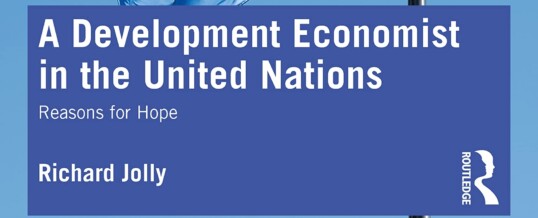
McLeod Group blog by Lauchlan T. Munro, September 11, 2023
Is the UN just an ineffectual talking shop, incapable of meaningful action? Richard Jolly does not think so. In his short, insightful and easy-to-read autobiography-cum-UN history, Jolly shows that the UN has long been at the forefront of intellectual and practical innovation in international development, though this contribution is widely overlooked. And, he asserts forcefully, ideas do matter.
Born into a middle-class English family, Jolly was sent as a child evacuee to Canada at the start of the Second World War. In 1945, he returned to the UK, read economics at Cambridge and, as a pacifist, declined to do his military service in the mid-1950s. For his refusal, he was sentenced by a London court to two years of work as a Community Development Officer in Kenya, then a British colony. There began his lifelong engagement with development.
Jolly was appalled by what he saw of British colonialism in Kenya and vowed to spend his career helping the soon-to-be independent states overcome their colonial legacies. Over the next five decades, Jolly got a PhD from Yale, worked in academia, the UN and the government of newly independent Zambia, while joining UN and other missions to study education, employment, manpower planning (a term that has thankfully fallen out of use!) and human development in Abu Dhabi, Cuba, Kenya, Uganda, Sri Lanka and Zambia. Jolly knew and worked closely with the first generation of post-independence political leaders in many countries; names like Kenneth Kaunda, V.K.R.V. Rao and Mahbub ul Haq pop up frequently in the book.
The culmination of his career was his almost 15 years as Deputy Executive Director of UNICEF, the UN Children’s Fund, under the charismatic leadership of Jim Grant, from 1982 to 1995. At UNICEF, he and Grant, with others such Kul Gautam, pioneered the use of global goals to prompt, even embarrass, national governments to invest more in what mattered for children: health, education, nutrition and child protection and to better monitor progress. As Jolly correctly points out, most of the Millennium Development Goals – and many of their successors, the Sustainable Development Goals – owe their inspiration and even their precise wording to the goals set at the World Summit for Children in 1990, which UNICEF organized.
Jolly lauds his great friend and boss, Jim Grant, while overlooking the latter’s flaws. (Grant’s focus on advocacy and programming meant that UNICEF’s back-office functions, especially IT and human resources, were in need of serious reform by the time of his departure.) Though he frequently mentions how “decentralized” UNICEF was as an organization, Jolly’s view of UNICEF is headquarters-centric, overlooking many innovations from field offices, including program planning software, analytical tools and national-level social and economic policy analysis.
His account of relations with other UN agencies is fascinating, though he did pull his punches with respect to UNESCO under the controversial leadership of A.M. M’Bow. Jolly has good things to say about ILO and WHO and their commitment to human development. However, he is highly critical of UNDP, saying that it “preferred to act as the little brother to the World Bank and the IMF instead of being big brother for the whole UN” (page 87).
Throughout the book, Jolly is disparaging of orthodox neoclassical economists. Being a structuralist economist, he is scathing about the World Bank and the International Monetary Fund’s structural adjustment policies. Several times he mentions Barro and Lee’s 2005 study that supported the UN’s longstanding criticisms of IMF structural adjustment policies; these policies were positively and significantly associated with contractions of national income, not growth. Jolly points out that the growth forecasts of the UN Department of Economic and Social Affairs have, over a 30-year period, been more accurate than those of the World Bank and IMF, though the UN’s have received far less public attention. He further points out that the Bank and the Fund have ignored the UN’s economic analyses, especially in flagship publications like the Bank’s annual World Development Report. He reminds us, with evident delight, that more UN-affiliated economists have won the Nobel Prize than have those affiliated with the World Bank.
Jolly’s book deserves to be widely read in international development studies programs, though I suspect it will not be. The critical approach that dominates most Canadian development studies programs has little interest in the issues Jolly addresses: the role of children in development, the key differences in style and substance between UN agencies, the role of ideas for promoting development, the key distinction between structuralist and neoclassical economics, and the role of development in overcoming colonial legacies. Jolly’s emphasis on economics, even of a decidedly heterodox kind, is also out of fashion in development studies in Canada today. Jolly’s old colleagues like Kaunda, Rao and ul Haq would be astonished to be told that “development is a colonialist project”, but that is the mainstream view in Canadian development studies these days.
The book has its flaws, including certain unnecessary repetitions and a distressing number of minor factual errors, usually concerning dates. Nonetheless, this is a valuable memoir by an important figure who combined development theory, policy and practice, spanning over half a century of history. It deserves to be widely read.
Lauchlan T. Munro is Full Professor and twice former Director of the University of Ottawa’s School of International Development and Global Studies. From 1989 to 2003 he worked for UNICEF. Richard Jolly was Lauchlan’s boss’s boss’s boss.
